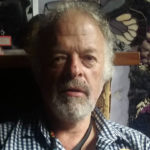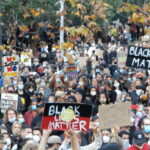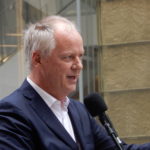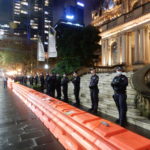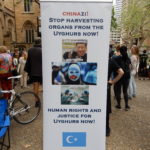“Defacing” the Governor Macquarie Statue: An Interview With Activist Stephen Langford
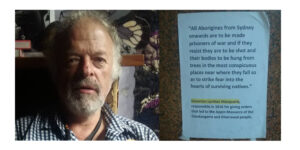
Social justice activist Stephen Langford was arrested by NSW police on 18 June, and subsequently denied bail, strip searched and incarcerated for 20 hours, all for pasting a message on the Hyde Park Governor Macquarie statue, which asked passers-by to question the monument’s legitimacy.
The apprehension and detainment of Langford – which involved officers tracking him across postcodes – came just days after two other incidents occurred that involved the defacing of Captain Cook statues in both Hyde Park and Randwick.
These incidents are part of a wider campaign over recent years, calling for the removal of colonial statues that celebrate public figures who were complicit in the dispossession and genocide perpetrated against the First Nations people of this continent.
So, Langford was simply asking whether a man such as Lachlan Macquarie – who called upon the military to murder Aboriginal people that didn’t comply with the British takeover – should be honoured in this manner.
No pride in genocide
British military officer Lachlan Macquarie served as the fifth governor of NSW from 1810 to 1821. The statue of him in Sydney’s Hyde Park states that “he was a perfect gentleman, a Christian and supreme legislator of the human heart”.
However, the notice that Langford craft glued to the statue paints a rather different picture of the autocratic ruler. It details the content of an 1816 directive that Macquarie gave to his military forces. It states:
“All Aborigines from Sydney onwards are to be made prisoners of war and if they resist they are to be shot and their bodies to be hung from trees in the most conspicuous places near where they fall so as to strike fear into the hearts of surviving natives.”
This led to the April 1816 Appin Massacre, which involved a British regiment killing at least 14 Dharawal and Gandangara people – some victims were shot, while others were run off a cliff. And Macquarie later told his superiors that it had been carried out in accordance with his orders.
A social justice warrior
Langford was awarded the Order of Timor in 2015, in recognition of his campaigning on behalf of the Timorese people. He appeared in the NSW Local Court in relation to the statue incident on 6 July. And this was the second time he’s appeared in court this year over minor protest actions.
Former SBS journalist and current lawyer Mark Davis is representing Langford in both matters. Back in February, Davis said that based on Langford’s persistent work on bringing public attention to the genocide that was happening in East Timor, he’ll “defend him any day of the week”.
Sydney Criminal Lawyers spoke to Stephen Langford about the time he spent in the Surry Hills lockup, the fact that the ultimate purpose of the strip search is to exert power, and why he asserts it’s about time that the public started to question whether colonial statues should continue to stand.
Firstly, you were arrested on 18 June for pasting a notice on the Governor Lachlan Macquarie statue in Hyde Park.
The content of the sign involved a directive that was given by the governor in 1816 regarding the wholesale killing of First Nations people.
Stephen, why did you paste this directive onto the statue?
I posted it on that statue, because it is a statue of Macquarie, which makes no mention about that.
And people should get the whole picture. Then they can make up their own minds about whether we should have that statue there.
It has to be on the basis of what he has done, and what he has said. Macquarie might have said he had to defend the colony. But what he was doing was part of a larger criminal enterprise known as colonialism – colonising and stealing land.
He mightn’t have seen himself as doing something criminal, but we should. And we should decide for ourselves whether we want a statue of him.
So, you’re suggesting that Sydney could get rid of this statue?
We don’t have to have a statue of him, because he’s a former governor. We can decide on what’s decent and proper now.
We can think about whether it’s smart and proper to go around killing unarmed people, and then to erect statues to a person who does this.
We don’t have to try and understand what they were doing. We have to judge it from what our values are, and whether it’s decent and proper.
You were actually arrested for this act. How did that come about? And what have you been charged with?
I was charged with damaging and defacing a protected monument. It’s ridiculous, because I haven’t done either.
What must have happened was, after the incident with the Cook statues, Berejiklian would have said, “If anyone touches a statue, come down on them like a ton of bricks.” Because what happened to me was a blatant overreaction.
My bail was refused, and I was kept overnight.
I believe they didn’t get you in Hyde Park, but rather Surry Hills. How long did it take for them to apprehend you? And didn’t you just use craft glue, which could easily be removed?
Yes. It was removed. And it happened around 7 pm. The officers appeared once I was on College Street. They intercepted me on College Street.
They told me that they saw me on CCTV. And so, they then must have conducted this manhunt. It was like the interception of a hardened criminal. It was absolutely mad.
It would have taken them about 10 to 15 minutes to find me. It doesn’t take too long to get from the north end of Hyde Park to College Street. I was on my bicycle.
And you were held overnight?
I was arrested at 7 pm on the Thursday and I was released at 3.30 pm on the Friday. My transfer from Day Street to the lockup at Surry Hills was at 1 am. I was refused bail and sent there.
Then there was a strip search. That wasn’t the worst thing. But to some people it would be. For me, the issue was there was nothing to read – nothing to occupy your mind, except worry. There wasn’t even a television – nothing.
There was no natural light. There were no clocks. So, you didn’t know what time it was. It was quite disorientating. And the toilet was in the middle of the cell.
They had an emergency buzzer and I said, “When am I going to be let out?” They said they couldn’t tell me. And I said, “Can I speak to your superior, please? And they said, “No.” I said, “Can I know your name?” And they said, “No.”
They were uncooperative and they treat you like rubbish. And this is what people go through. There’s a whole group of marginalised people who just go through this if they’re caught up in the prison system.
People say, “Well, they’ve done something wrong.” And they may well have done something wrong, but it’s meant to be corrective services, not the brutalising services.
And that’s what they’re doing. Not only to the inmates, they’re doing that to the police and the prison guards as well. It’s a brutal regime. It’s horrible.
You mentioned that you were strip searched, but you’d only been taken in for pasting up a sign with water soluble glue?
That was just part and parcel of going into the lockup. They didn’t look at what you had done before they strip searched you.
If you are sent to Surry Hills lockup, that’s just standard form – ostensibly, so you are not carrying anything.
A battle has already been fought about strip searches. It’s an act of humiliation. It really is. It’s an exercise of power. Whatever reason they give for it, that’s the ultimate thing.
But, for me, the main thing about being there was the sensory deprivation. In the cell, they wouldn’t give you anything. They wouldn’t give you anything to read. There was nothing.
At least in a prison, there would be something to read. So, you’re not stuck with your own thoughts. It’s mind-crushing, soul-destroying boredom.
People talk about this when they’re held in so-called detention as refugees. Soul-destroying is the word to use. It’s soul-destroying.
And lastly, Stephen, you recently appeared at the Downing Centre Local Court over this matter. Lawyer Mark Davis will be representing you, as he also is on an earlier charge.
What happened at court? And how are you feeling about it all?
I asked them to drop the charges and they didn’t. But I was kind of glad about that, because we had a really great demonstration outside, and a lot of people spoke. It was quite uplifting.
Socialist Alliance’s Jim McIlroy spoke. Former Australian Greens Senator Lee Rhiannon and Jews Against the Occupation activist Vivienne Porzsolt spoke, as well as a few other people. We also had musicians.
Then I went inside, and it was just a mention. I said I was not guilty. I refused to use the word “plead”. I hate the word. I am not pleading anything. I am not guilty.
Mark Davis will take them to the cleaners. That other matter is coming up in September. But the Macquarie thing will be back in court on 17 August.
Davis is going to do a freedom of speech defence for both matters. It’s pretty good, that’s how it should be.


